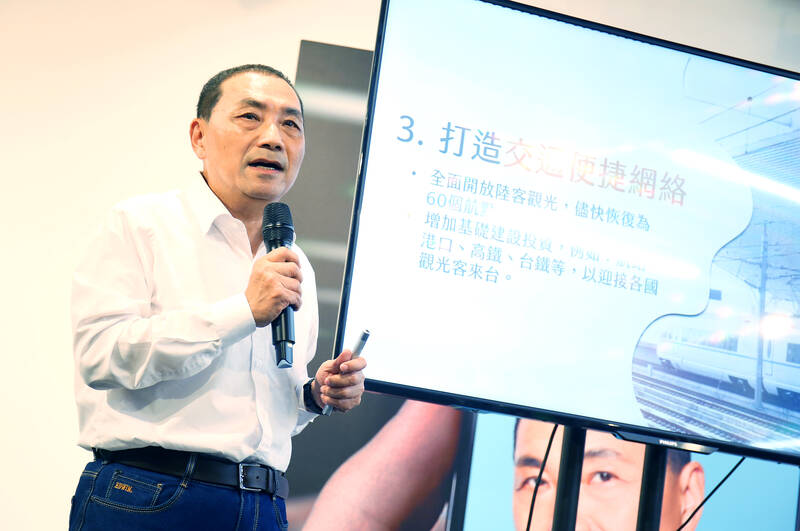New Taipei City Mayor Hou You-yi (侯友宜), the Chinese Nationalist Party’s (KMT) presidential candidate, on Thursday said that if elected, he would increase the number of Chinese visitors to Taiwan and resume direct flights to 60 Chinese cities.
Taiwan currently allows flights to 10 Chinese cities, in addition to 13 Chinese cities that accept cross-strait charter flights, according to the Mainland Affairs Council (MAC).
Hou told a news conference in New Taipei City that his proposal would boost Taiwan’s tourism industry, whose average growth has dropped from 15 percent during the previous KMT administration to 3 percent under President Tsai Ing-wen’s (蔡英文) leadership.

Photo: CNA
If elected, Hou promised to raise the government’s tourism budget by 15 to 20 percent annually, as well as increase investment in infrastructure, including airports, ports, high-speed rail and traditional rail services.
Setting a target of attracting 18 million tourists per year in the first four years of his term, Hou said his administration would enhance tourism activities, such as medical tourism, cruises, food, art, culture, religion, exhibitions, sports, marine and outdoor activities to boost economic benefits from tourism.
Due to strained cross-strait relations and zero communication, the Tsai administration’s touted influx of 1 million Chinese tourists, made earlier this year, would be impossible to achieve, Hou said.
The current situation not only deters Chinese tourists from visiting, but has also eroded mutual trust, he said, adding that a resumption of cross-strait dialogue and communication would attract Chinese tourists back to Taiwan and stimulate the economy.
Since Tsai assumed office in May 2016, Taiwan has seen a decline in Chinese tourist arrivals, as Beijing gradually tightened control and management of tourism to Taiwan, a move widely interpreted as retaliation for Tsai’s refusal to endorse the so-called “1992 consensus.”
Starting on Aug. 1, 2019, Beijing prohibited Chinese tourists from traveling independently to Taiwan, citing “current cross-strait relations.”
At the early stage of the COVID-19 pandemic in January 2020, it also banned group travel to Taiwan.
In contrast, Taiwan permits individuals to travel to China for leisure or study, although the restriction on travel agencies organizing group trips to China remains in place as part of the country’s COVID-19 control measures.
However, from Friday next week, Taiwan is to reopen its borders to Chinese tourists who either reside or study in a third country.
The ban on group travel to China is likely to be lifted following a one-month preparatory period, the MAC said on Thursday.

Chinese Nationalist Party (KMT) Chairman Eric Chu (朱立倫), spokeswoman Yang Chih-yu (楊智伃) and Legislator Hsieh Lung-chieh (謝龍介) would be summoned by police for questioning for leading an illegal assembly on Thursday evening last week, Minister of the Interior Liu Shyh-fang (劉世芳) said today. The three KMT officials led an assembly outside the Taipei City Prosecutors’ Office, a restricted area where public assembly is not allowed, protesting the questioning of several KMT staff and searches of KMT headquarters and offices in a recall petition forgery case. Chu, Yang and Hsieh are all suspected of contravening the Assembly and Parade Act (集會遊行法) by holding

PRAISE: Japanese visitor Takashi Kubota said the Taiwanese temple architecture images showcased in the AI Art Gallery were the most impressive displays he saw Taiwan does not have an official pavilion at the World Expo in Osaka, Japan, because of its diplomatic predicament, but the government-backed Tech World pavilion is drawing interest with its unique recreations of works by Taiwanese artists. The pavilion features an artificial intelligence (AI)-based art gallery showcasing works of famous Taiwanese artists from the Japanese colonial period using innovative technologies. Among its main simulated displays are Eastern gouache paintings by Chen Chin (陳進), Lin Yu-shan (林玉山) and Kuo Hsueh-hu (郭雪湖), who were the three young Taiwanese painters selected for the East Asian Painting exhibition in 1927. Gouache is a water-based

Taiwan would welcome the return of Honduras as a diplomatic ally if its next president decides to make such a move, Minister of Foreign Affairs Lin Chia-lung (林佳龍) said yesterday. “Of course, we would welcome Honduras if they want to restore diplomatic ties with Taiwan after their elections,” Lin said at a meeting of the legislature’s Foreign Affairs and National Defense Committee, when asked to comment on statements made by two of the three Honduran presidential candidates during the presidential campaign in the Central American country. Taiwan is paying close attention to the region as a whole in the wake of a

OFF-TARGET: More than 30,000 participants were expected to take part in the Games next month, but only 6,550 foreign and 19,400 Taiwanese athletes have registered Taipei city councilors yesterday blasted the organizers of next month’s World Masters Games over sudden timetable and venue changes, which they said have caused thousands of participants to back out of the international sporting event, among other organizational issues. They also cited visa delays and political interference by China as reasons many foreign athletes are requesting refunds for the event, to be held from May 17 to 30. Jointly organized by the Taipei and New Taipei City governments, the games have been rocked by numerous controversies since preparations began in 2020. Taipei City Councilor Lin Yen-feng (林延鳳) said yesterday that new measures by